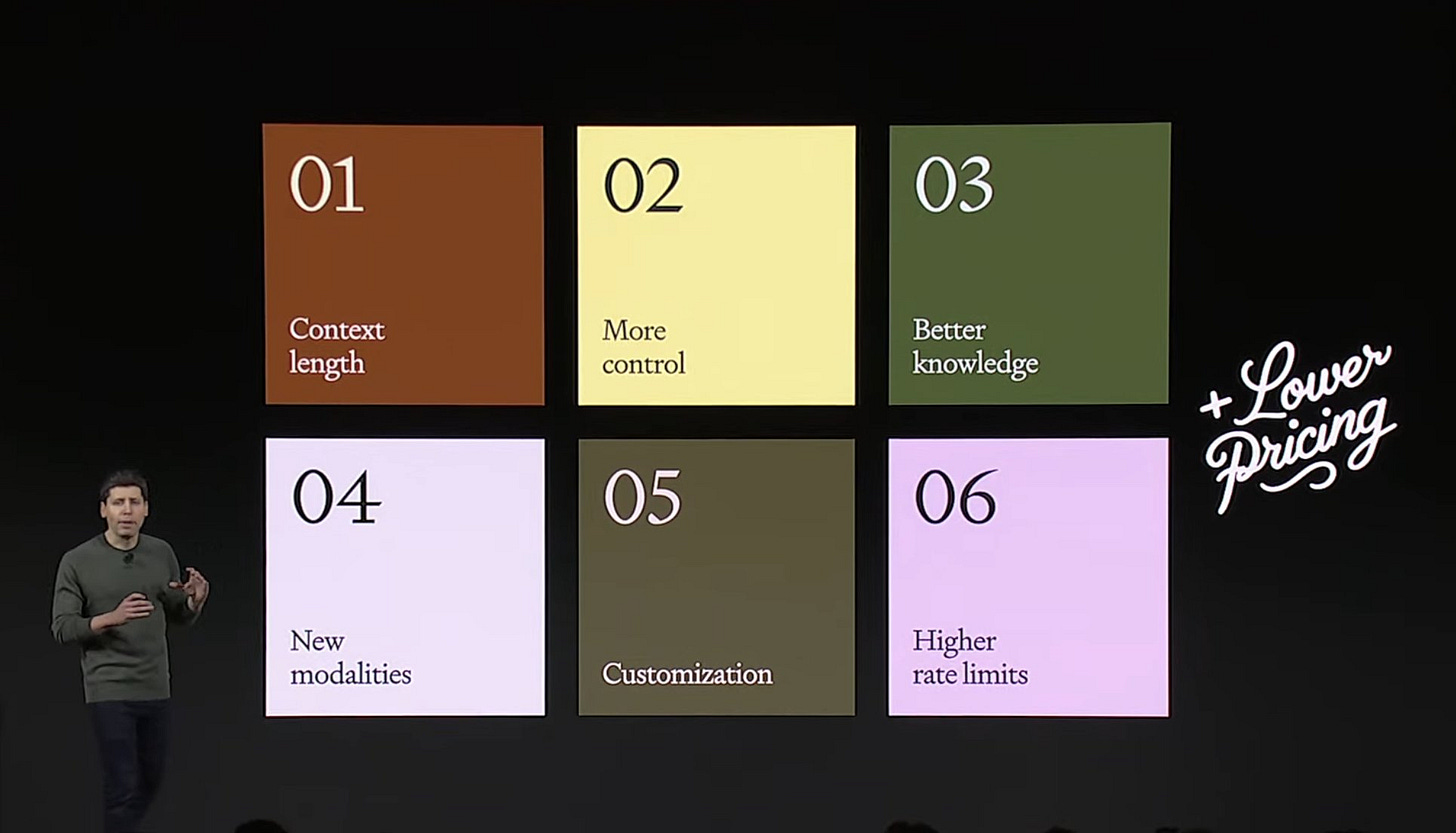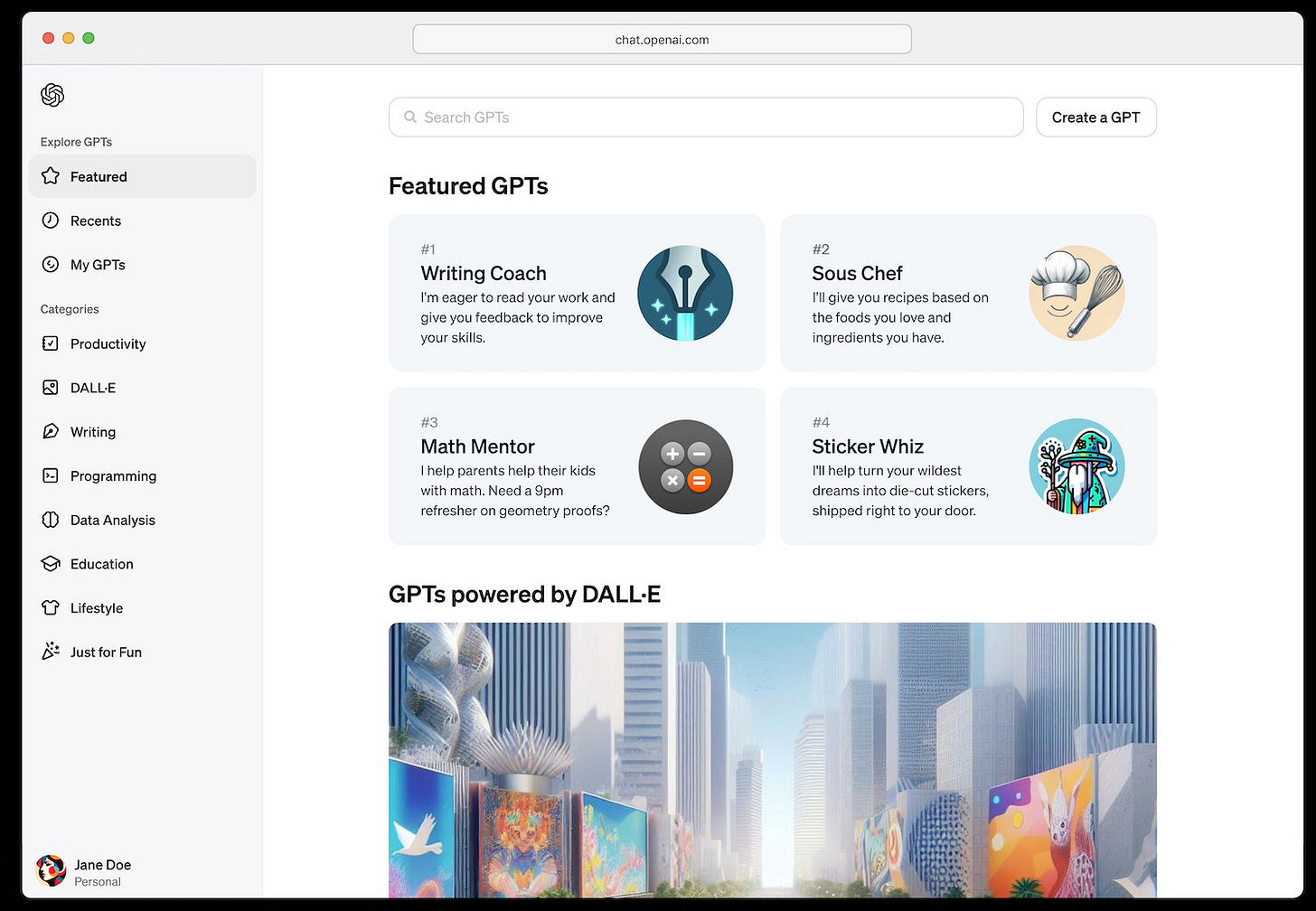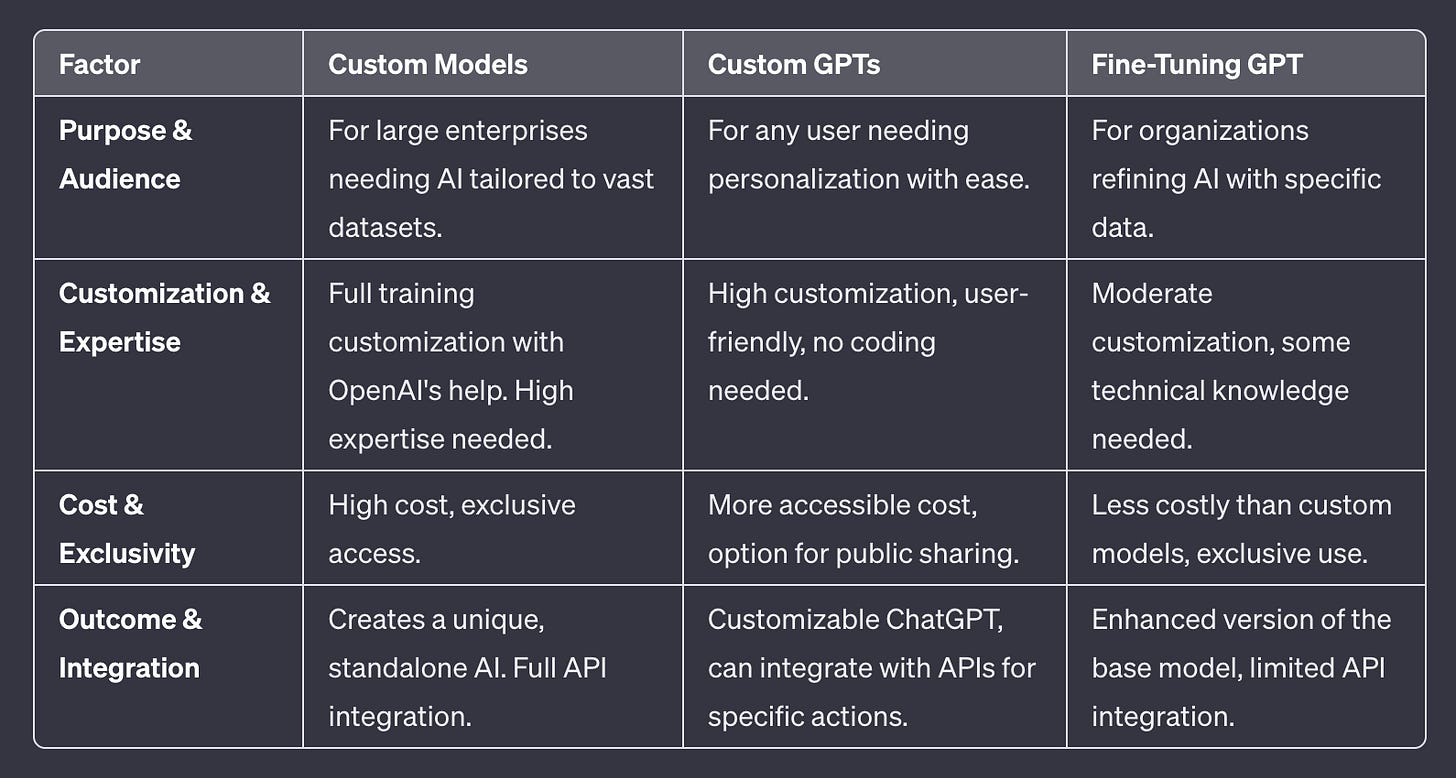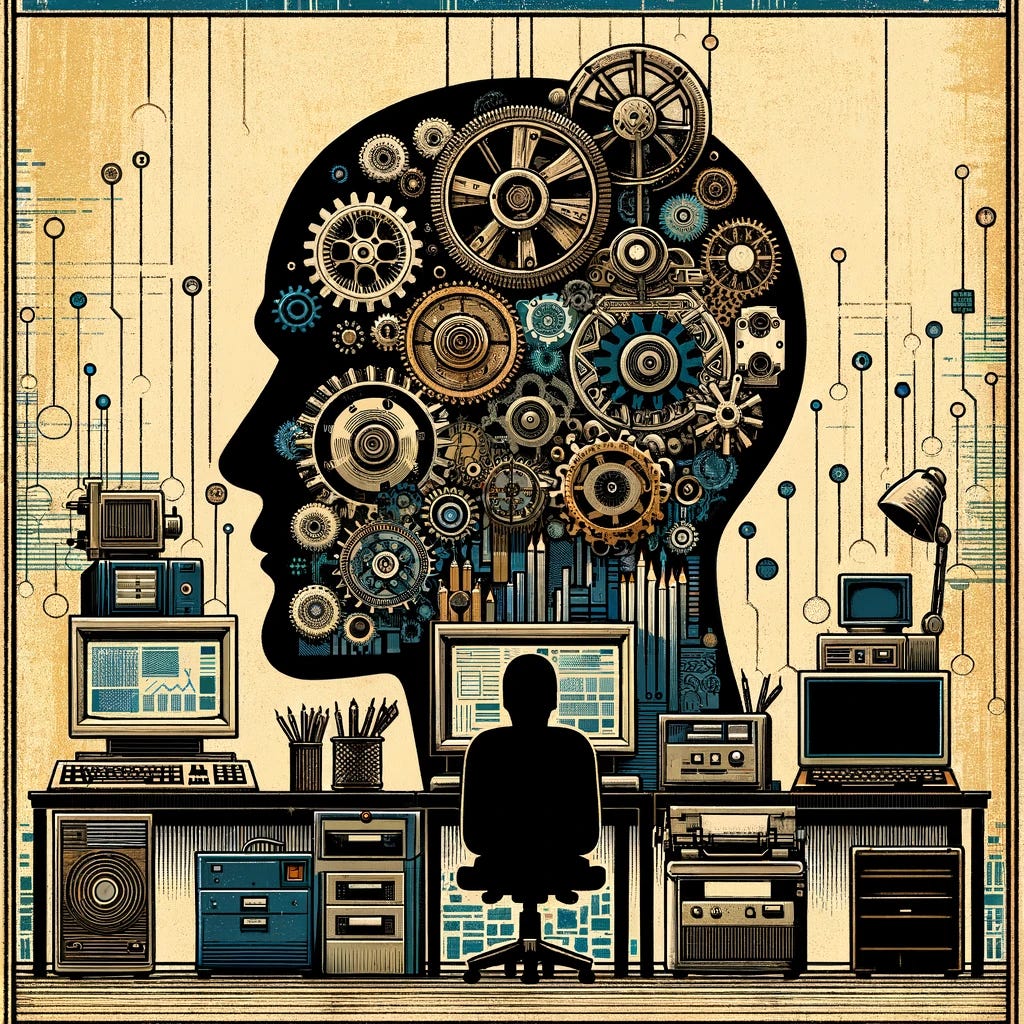Issue #5: OpenAI Unleashes New Wave of AI Democratisation in the Enterprise
No-Code LLMs, Custom GPTs, and the Future of AI/ML in the Wake of DevDay Announcements
When we look back on the advancement of AI, OpenAI’s first DevDay or developer day will be seen as a milestone, especially in terms of how AI is built and adopted across the enterprise.
Earlier this week, OpenAI introduced a suite of enhancements and new capabilities that promise to redefine our interaction with AI technologies.
These innovations are set to streamline how AI integrates into our daily workflows, making it more accessible across various levels of expertise. The focus is now on empowering businesses of any scale to tailor AI to their specific needs.
In this edition of ‘The Uncharted Algorithm‘, we'll explore the key announcements from OpenAI DevDay, such as custom GPTs, fine-tuning advancements, and the much-discussed 128k context window.
We'll also delve into the strategic impact of these developments, from reshaping internal teams to altering the competitive landscape.
OpenAI DevDay Highlights
Custom GPTs
OpenAI announced a no-code platform for building Custom GPTs, a significant step forward in making AI customisation user-friendly and democratising the ability to build and proliferate these across the enterprise.
These GPTs are designed to cater to specific tasks without the need for complex programming, allowing businesses to create AI applications unique to their operations and customer interactions.
RAG Features
OpenAI's integration of Retrieval-Augmented Generation (RAG) into their no-code GPT builder represents a leap forward in AI customisation.
This enables businesses to incorporate their own datasets, such as PDFs, Excel files, or other proprietary knowledge bases, into the AI model's responses. Custom GPT can provide information that is not only based on the large-scale data it was trained on, but also enriched with specific, up-to-date details from an organisation's own documents.
Consequently, enterprises can create AI applications that deliver more accurate and contextually relevant answers, reflecting the latest internal reports, research papers, financial models, or any other material they choose to integrate.
This adds a layer of personalised intelligence, ensuring that the GPTs can serve as even more efficient and knowledgeable assistants tailored to the unique needs and challenges of the business.
GPT Store
OpenAI has announced the GPT Store, a new ‘app-like‘ marketplace that will feature a collection of Custom GPTs created by verified builders. This platform hopes to become a hub for sharing and discovering a wide array of GPTs, each tailored to different tasks and industries.
The GPT Store will enable businesses to easily access and deploy ready-made AI solutions, further democratising the use of advanced AI technologies.
Custom Models
For enterprises with extensive and specialised data, OpenAI has introduced the Custom Models program.
This initiative enables organisations to collaborate directly with OpenAI's experts to develop GPT-4 models that are finely tuned to their particular domain, incorporating large-scale, proprietary datasets into the model's foundation.
Pricing starts at $1 million plus.
Fine-Tuning
OpenAI has opened experimental access for fine-tuning GPT-4, although achieving substantial improvements will require more effort compared to GPT-3.5.
This process involves retraining the base model on an organisation's data to enhance its performance on specific tasks or within certain domains.
Comparison of Approaches
For those that need the utmost control and specificity in AI performance, investing in a Custom Model may be the ideal route.
Meanwhile, enterprises looking for a balance between customisation and cost might find Fine-Tuning GPT to be a good solution.
Finally, Custom GPTs offer an agile and user-friendly approach that can quickly adapt to various business needs without substantial upfront investment or technical barriers.
GPT-4 Turbo
The newly released GPT-4 Turbo offers a longer 128K token context window (GPT-4 context window is 8k tokens and Claude uses 100k tokens), allowing the AI to remember and reference more information within a conversation.
It's also more cost-effective, with input tokens priced 3x lower and output tokens 2x lower than the standard GPT-4, making it a more viable option for developers and businesses.
Unified Multimodal Capabilities
OpenAI has not only been innovating on multimodal advancements enabling the processing of diverse data types - from text to images - but is now offering that through a single AI interface, offering a versatile tool that can be incorporated into a wide array of enterprise applications.
This makes it easier to work with ChatGPT instead of switching between image generation, code interpreter and web browsing conversations.
Strategic Implications of AI Democratisation for Enterprises
As we delve into the strategic implications, it becomes clear that these innovations are not just technical enhancements but catalysts for transformation across the enterprise.
No-Code AI Agents: Expanding AI Across Enterprises
The arrival of no-code platforms for building custom GPTs or ‘AI Agents’ presents new opportunities and challenges. Expect other Foundational Model companies and possibly Cloud AI providers to follow suit.
These platforms are set to enhance business processes by empowering employees, regardless of their programming skills, to develop AI tools tailored to their unique roles and challenges.
Imagine a salesperson crafting an AI agent that sifts through customer data to tailor sales pitches, or HR personnel deploying a bot to streamline recruitment. Even software engineers could leverage these tools to generate code automatically, streamlining tedious parts of their workflow.
For such innovations to be effective and safe, education will play a crucial role. As companies begin to weave AIs into the fabric of various departments, they'll need to ensure their teams are trained not just in how to use AI, but also in understanding its scope and limitations.
With these no-code AI Agents, the potential benefits for enterprises that move quickly are immense - improved customer engagement, accelerated innovation, and cost savings.
But this comes with a caveat - without robust governance, the risk of misuse and the potential for damaging the brand is real. Establishing ethical guidelines and maintaining transparency will be as crucial as the technology itself.
As businesses navigate this shift, those that integrate no-code AI agents thoughtfully and strategically are likely to outpace their competitors.
It's not just about adopting new tools - it's about reshaping business models to harness the full potential of AI while mitigating associated risks.
This approach is what will define leaders in the next wave of enterprise productivity and innovation.
Redefining AI/ML Teams: The Shift from Creation to Integration
As no-code AI agents become more prevalent, the role of AI/ML teams within enterprises needs a rethink.
The traditional focus on creating models and fine-tuning algorithms will expand to include the strategic integration of AI across business functions.
These teams will need to switch to becoming the architects of AI deployment, blending their technical expertise with a deep understanding of business needs to ensure AI initiatives align with and drive strategic objectives.
In the future, we will see AI/ML professionals not just as developers but as consultants and advisors within their organisations. They will be responsible for understanding the capabilities and limitations of AI tools and matching them with business use cases.
This requires a hybrid skill set that combines technical AI know-how with sector-specific knowledge, enabling these teams to tailor AI applications to the nuanced demands of different business areas.
To facilitate this transition, companies will need to reassess how they structure their AI/ML teams. There will be a growing need for roles focused on AI governance, ensuring ethical and responsible use, and AI project managers who can oversee the implementation of AI solutions from a strategic perspective.
Training programs will also need to evolve to prepare staff for these new roles. These programs will likely cover a range of topics, from the technical aspects of AI to project management, change management, and business strategy, ensuring that AI/ML teams are equipped to take on their new integrator and strategist roles effectively.
As AI/ML teams become more integral to business strategy and operations, their work will directly influence the company's trajectory.
Their ability to seamlessly integrate AI tools and align them with business goals will be critical in driving innovation, competitive advantage, and, ultimately, success in the evolving market landscape.
Elevating AI Services: The New Mandate for Vendors
In response to OpenAI's advancements with custom GPTs, AI vendors will face a market shift that requires them to elevate their services.
Vendors must move up the value chain, delivering services that integrate deeply with client operations and strategic objectives.
The era of providing basic AI models and tools will give way to a need for more sophisticated, strategic offerings.
Vector Database Providers
Vector databases, crucial in managing high-dimensional data like images and natural language, face challenges with the rise of custom GPTs. However, with OpenAI’s newfound ability to feed knowledge through custom GPT’s using a no-code approach lessens reliance on external databases.
This shift pushes vector database providers to evolve beyond mere data storage. They now need to focus on offering analytical and insight-driven services, aligning with OpenAI's streamlined AI processes. By providing services like data quality assessment, enrichment, visualisation, and data-driven decision-making, these providers can maintain relevance and competitive edge in a rapidly evolving market.
Chatbot Vendors
Chatbot vendors, too, must reassess their offerings. With businesses now able to craft customised AI-driven interactions in-house, the standard chatbot functionality is no longer a competitive edge.
Vendors must enhance their platforms with advanced integration capabilities, industry-specific customisation, and superior analytics that leverage the nuanced capabilities of Custom GPTs.
AI Model Marketplaces
Looking ahead, AI model marketplaces will likely undergo a pivotal shift, transitioning from mere repositories of pre-built models to dynamic hubs for AI agent development and customisation.
They'll evolve into platforms that facilitate the creation of bespoke AI agents, tailored to meet specific business needs. This evolution will involve providing advanced tools and expert guidance, enabling businesses to manage and fine-tune their AI agents effectively.
These marketplaces will play a crucial role in ensuring that AI integrations are seamlessly aligned with business objectives, making AI agents an integral, responsive, and evolving part of business strategies.
AI Service Providers
As we advance into the era of no-code AI agents, AI service providers face critical imperatives that they must address to remain relevant and effective.
It's crucial for them to move beyond traditional offerings and become adept at integrating no-code AI agents into complex business environments. This will demand a deep understanding of how these agents can be tailored to address unique industry-specific domains. Providers must not only be technologically proficient but also exceptionally strategic, guiding businesses through a landscape where AI is more democratised and accessible than ever.
Their expertise must evolve to focus on high-level strategic consulting, ensuring businesses can maximise the potential of no-code AI agents. This involves being ahead of the curve in anticipating challenges and opportunities presented by these agents, and helping clients navigate these dynamics effectively.
The Democratisation Directive: Enterprises at the Crossroads of AI Innovation
As the wave of AI democratisation gains momentum, enterprises stand at a pivotal point, necessitating a comprehensive reassessment in the face of no-code AI agents.
This shift isn't just about technological adaptation; it's a holistic transformation impacting employees, customers, competitors, and the very nature of vendor relationships.
Empowering Employees
The essence of democratisation lies in making advanced AI tools like custom GPTs universally accessible within an enterprise.
Empowering employees with these no-code AI agents enables them to experiment and innovate in a safe, yet dynamic environment.
This move can unlock unprecedented efficiencies and novel AI applications, fostering a culture of agility and proactive innovation at all levels of the organisation.
Revolutionising Customer Experiences
Customers stand to reap immense benefits from this paradigm shift. As employees harness the power of no-code AI to customise services, customer experiences will become increasingly personalised and responsive.
This trend is setting a new standard in customer-centric innovation, where service delivery is not just efficient but remarkably attuned to individual needs and preferences.
Staying Competitive
For enterprises already on their AI journey, the advent of no-code AI agents is a wake-up call to reassess strategies and avoid clinging to outdated methodologies.
The agility and sophistication of these AI agents mean that traditional AI deployment models are rapidly becoming obsolete. Maintaining a competitive edge now demands a commitment to continuous learning, experimentation, and adaptation.
Redefining Vendor Partnerships
In the era of no-code AI agents, vendor relationships must evolve significantly. Vendors can no longer rely solely on providing advanced solutions; they must also ensure these solutions are cost-effective, time-efficient, and offer distinct advantages over accessible no-code options.
Enterprises will increasingly gravitate towards vendors who not only keep pace with technological advancements but also support and accelerate the deployment of these flexible and powerful AI capabilities.
Conclusion
In conclusion, the developments announced at OpenAI's DevDay represent a significant step forward in AI technology and its application in business.
Enterprises that embrace these changes, adapt their strategies accordingly, and focus on the strategic, ethical, and operational aspects of AI adoption will be well-positioned to lead in this new era of AI-driven business innovation.
These shifts promise to bring about a more intuitive, efficient, and customisable AI experience across the enterprise spectrum, fundamentally altering how businesses operate and compete.
The future of AI in business is not just about advanced technologies but about integrating these technologies seamlessly and strategically into the fabric of business operations.








